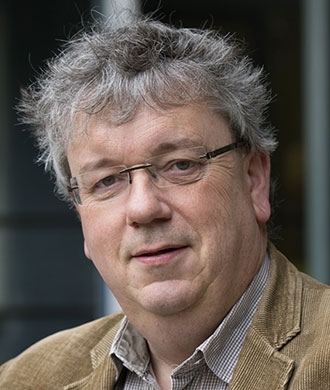Experts say that the transition from fossil fuels to new energy sources (such as hydrogen to replace petrol) should have been completed by 2050. Fossil fuels play an important part in global warming; they have also nearly run out. The world therefore needs to switch to different, renewable energy sources. Solar energy seems to be the best option. Researchers in various disciplines at Leiden University are conducting unique research that is will help us make the transition to renewable energy and reduce CO2 emissions.
Fundamental research – the basis for generating and storing energy
The research focuses primarily on generating and storing energy. Chemists in Leiden are working on questions such as: how do we get the most out of sunlight when generating electrical energy? How do we convert this into fuel? And what is the best way to store this energy for later use?
Chemistry professor Marc Koper is an authority in the area of CO2 reduction and using electrolysis to convert water and CO2 into useful products, such as hydrogen and small carbon-containing molecules. Hydrogen can be used as fuel. Koper is researching the electrolysis of CO2 into various products to discover exactly how this process works and how we can make it as efficient as possible.
A few doors further along, the research group of biochemist Huub de Groot has spent many years working on a revolutionary system for imitating plant photosynthesis of sunlight to make various different chemical products. If we can copy that process, we will also be able to use sunlight to produce fuels. The group has already made great progress: we now know much more about the precise operation of photosynthesis, and the design of a physical system is getting closer all the time.
Irene Groot is a chemist who specialises in the process of catalysis. If we want to convert CO2 into clean fuels on an industrial scale, we will need the right catalysts: surfaces on which the chemical reaction takes place. But we still know far too little about catalysis to decide what form the perfect catalyst has to take. Groot is one of the first to research catalysis under real-life industrial conditions, that is to say: under high pressure and at a high temperature.
Preventing public resistance to energy projects
Switching to different energy sources also has major consequences for how we live our lives and where we live them. New facilities to generate and store renewable energy will need to be built, for instance. This will have an impact on local residents, which means that the right way will need to be found to involve them in these construction projects. Researchers at Leiden are investigating how the public perception of energy projects arises, and how potential resistance can be avoided. Psychologist Emma ter Mors (Faculty of Social and Behavioural Sciences) has been collecting data about this since 2004, and her findings often surprise policymakers who are engaged in energy projects. Geographer Bríd Walsh (LUC The Hague) concludes that people must be persuaded to become ‘energy citizens’ with a personal interest in energy transition.
Researchers at Leiden University are not only looking into new ways to generate energy. To safeguard our future, we will also have to use existing raw materials more carefully. The Leiden Institute of Environmental Sciences (CML) has the world’s largest raw materials database and gathers essential knowledge about how raw materials are used.
The year 2050 is approaching fast. The research conducted by Leiden University scientists is helping on many different fronts to meet this urgent deadline.
Leiden Institute of Chemistry
Faculty of Social and Behavioural Sciences
LUC The Hague
Institute of Environmental Sciences

















